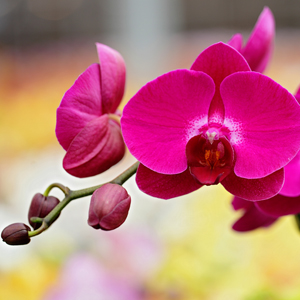 In our previous post, we discussed several questions that come to mind when caring for your orchid. Below we continue to go over some concerns you may have.
In our previous post, we discussed several questions that come to mind when caring for your orchid. Below we continue to go over some concerns you may have.
Question: I’d like to place my new Phalaenopsis orchid in the basement. Do you think I will have problems with the plant?
Potentially. Here’s why…Most basements are typically cooler areas of a home. While the Phalaenopsis orchid does well in indoor environments, the plant does its best when it lives in temperatures that range from 75 to 85 degrees. The plants will adapt to temperatures ranging from 65 to 70 degrees. Another thing to consider when placing a Phalaenopsis orchid plant in the basement is that orchids thrive in humid environments. If the basement is humid, then the orchid will do fine. A dryer climate basement will not allow a Phalaenopsis orchid plant to grow. Another thing to take into consideration is the lighting in the basement. Phalaenopsis orchids need indirect sunlight to grow properly. Being that a basement is underground, there may not be sufficient natural lighting available to properly grow a Phalaenopsis orchid plant.
Question: What do I do after my Phalaenopsis orchid plant stops blooming?
The Phalaenopsis orchid plant is the only orchid that is capable of reblooming from its old spike. That, however, does not mean that this will occur with every Phalaenopsis orchid plant or that it is always a good idea to leave the spike. Some plants are genetically incapable of reblooming, and those that do rebloom often have smaller flowers than the original flowers that once appeared. Some people will choose to leave the spike intact to see what happens. Some will choose to cut the orchid stem off entirely at the base. Others will choose to cut the stem above the bottom two nodes. It is highly recommended that all cutting utensils be sterilized as a means of preventing the spread of viruses.
If you have additional questions about caring for your orchid, check out our Frequently Asked Questions or join fellow orchid enthusiasts on our Facebook page.

Copyright Just Add Ice® Orchids 2023